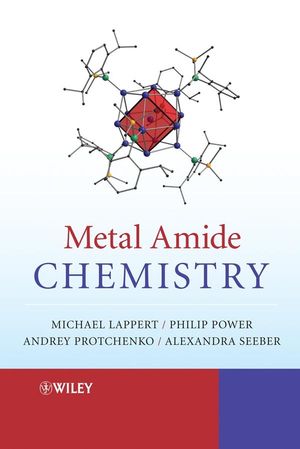Metal Amide ChemistryISBN: 978-0-470-72184-1
Hardcover
370 pages
February 2009
 |
||||||
Philip Power received a b.A. from trinity college Dublin in 1974 and a D. Phil, under M. F. Lappert from the University of Sussex in 1977. After postdoctoral studies with R.H. Holm at Stanford University, he joined the faculty at the department of Chemistry at the University of California at Davis in 1981, where he is a Distinguished Professor of chemistry. His main interests lie in the exploratory synthesis of new main-group and transition-metal complexes. A major theme of his work has been the use of sterically crowded ligands to stabilize species with new types of bonding, low coordination numbers, and high reactivity. He has been the recipient of several awards including the A. P. Sloan Foundation Fellow (1985), Alexander von Humboldt Fellowship for Senior U. S. Scientist (1992), Ludwig Mond Medal of the Royal Society of Chemistry (2005), F.A. Cotton Award in Synthetic Inorganic Chemistry of the American Chemical Society (2005) and was elected Fellow of the Royal Society of London (FRS) (2005).
Andrey Protchenko was born in 1961 in Rostov-on-Don, Russia. A graduate of the Moscow State University (Russia) in 1983, he carried out his doctoral work at the Karpov Institute of physical Chemistry (Moscow) and completed his Ph.D. in chemistry (1997) at the Razuvaev Institute of Organometallic Chemistry (Nizhny Novgorod) under the supervision of Prof. M. N. Bochkarev studying naphthalene complexes of the lanthanides. In 1998 he joined the group of Prof. M. F. Lappert at the University of Sussex (England) working on a series of projects (Royal Society, EPSRC and Leverhulme trust grants) involving lanthanide redox chemistry based on cyclopentadienyl, N- and N, N' -centred ligands.
Alexandra Seeber, nee Pickering, was born in 1979 in Lichfield, UK. After graduating in chemistry at Keele University in 2001 and completing a Ph.D. in Inorganic Chemistry into the design and synthesis of ligands for the controlled self-assembly of tr5ansition metal complexes at the University of Glasgow (Scotland) in 2004, she carried out postdoctoral research into nanoparticle synthesis at the University of California, Davis with Prof. Philip Power under a Department of energy grant for the Design of high surface area materials as hydrogen storage vessels. Alexandra Seeber has worked since 2006 in Research and development in the catalysis department at BASF in Ludwigshafen (Germany).



